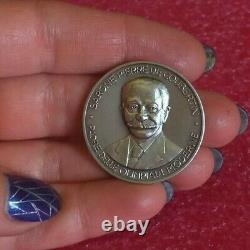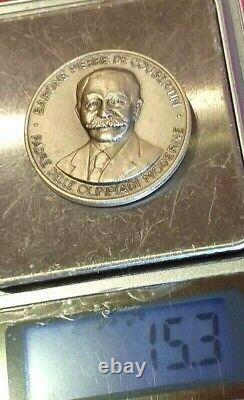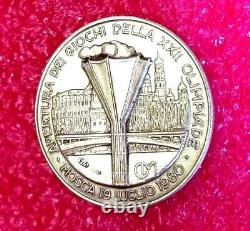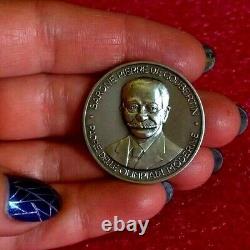1980 Moscow Games Father Modern Olympic Italian Silver medal Baron de Coubertin






Silver medal, Rome MINT, very beautiful medal. Charles Pierre de Frédy, Baron de Coubertin. Born Pierre de Frédy ; 1 January 1863 - 2 September 1937, also known as Pierre de Coubertin and Baron de Coubertin was a French educator and historian, founder of the International Olympic Committee. He is known as the father of the modern Olympic Games. Born into a French aristocratic. Family, he became an academic and studied a broad range of topics, most notably education and history. He graduated with a degree in law and public affairs from the Paris Institute of Political Studies. It was at Sciences Po that he came up with the idea of the Summer Olympic Games. The Pierre de Coubertin medal. (also known as the Coubertin medal or the True Spirit of Sportsmanship medal) is an award given by the International Olympic Committee. Who demonstrate the spirit of sportsmanship.
Pierre de Frédy was born in Paris on 1 January 1863, into an aristocratic family. He was the fourth child of Baron Charles Louis de Frédy, Baron de Coubertin. And Marie-Marcelle Gigault de Crisenoy. Family tradition held that the Frédy name had first arrived in France in the early 15th century, and the first recorded title of nobility granted to the family was given by Louis XI.
To an ancestor, also named Pierre de Frédy, in 1477. But other branches of his family tree delved even further into French history, and the annals of both sides of his family included nobles of various stations, military leaders and associates of kings and princes of France.Pierre de Coubertin as a child (right), with one of his sisters, painted by his father Charles Louis de Frédy, Baron de Coubertin. (detail of Le Départ, 1869).
His father Charles was a staunch royalist and accomplished artist whose paintings were displayed and given prizes at the Parisian salon. At least in those years when he was not absent in protest of the rise to power of Louis Napoleon. His paintings often centred on themes related to the Roman Catholic Church.Classicism, and nobility, which reflected those things he thought most important. In a later semi-fictional autobiographical piece called Le Roman d'un rallié, Coubertin describes his relationship with both his mother and his father as having been somewhat strained during his childhood and adolescence.
His memoirs elaborated further, describing as a pivotal moment his disappointment upon meeting Henri, Count of Chambord. Whom the elder Coubertin believed to be the rightful king. Coubertin grew up in a time of profound change in France: France's defeat in the Franco-Prussian War. And the establishment of the French Third Republic.
And later the Dreyfus affair. But while these events were the setting of his childhood, his school experiences were just as formative. In October 1874, his parents enrolled him in a new Jesuit school called Externat de la rue de Vienne, which was still under construction for his first five years there. While many of the school's attendees were day students, Coubertin boarded at the school under the supervision of a Jesuit priest, which his parents hoped would instill him with a strong moral and religious education.There, he was among the top three students in his class, and was an officer of the school's elite academy made up of its best and brightest. This suggests that despite his rebelliousness at home, Coubertin adapted well to the strict rigors of a Jesuit education. As an aristocrat, Coubertin had a number of career paths from which to choose, including potentially prominent roles in the military or politics. But he chose instead to pursue a career as an intellectual, studying and later writing on a broad range of topics, including education, history, literature and sociology.


